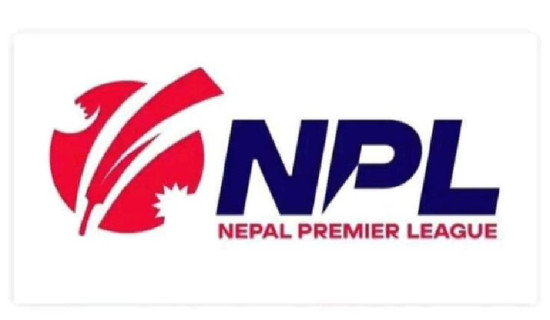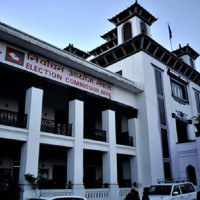- Saturday, 6 December 2025
MoFA is ready to improve service delivery at foreign missions: Minister Rana
The past 100 days have been highly engaging for Foreign Minister Dr. Arzu Rana Deuba with multiple national and international events including the United Nations General Assembly, Women Foreign Ministers' Meeting and Asia Cooperation Dialogue taking place during the period. She represented Nepal at various forums and panels at the 79th UNGA and put forth Nepal's agenda on peace, development and climate change. Modnath Dhakal of The Rising Nepal daily caught up with Minister Dr. Deuba to talk about the progress and notable achievements of the Ministry of Foreign Affairs (MoFA). Excerpts:
It has been 100 days since you were appointed Minister for Foreign Affairs. How would you assess the current state of government's international relations during this period?
Probably, the most important work that we did in the recent past is the successful representation of the country at the 79th United Nations General Assembly (UNGA), Summit of the Future and forums of the Least Developed Countries (LDCs), Landlocked LDCs and G77 plus China. Nepal also got a chance to speak at the UN Security Council which has enhanced the visibility of the country.
PM KP Sharma Oli and I both got extremely busy at the UNGA. PM chaired a session in the 'Summit of the Future' and for the LDCs. We informed the world about the successful conclusion of the domestic process and voiced our concerns for the world peace and updated the international community about the peace process in Nepal. Meanwhile, we also signed various bilateral mechanisms and agreements including with the United States of America (for the first time since the establishment of the bilateral relationship), Indonesia and Romania. These are achievements that will benefit us in the long run. Nepal and Indonesia have signed agreements for bilateral consultation mechanism and visa exemption agreement for diplomatic and official/service passport holders.
We held about 43 meetings at the Foreign Minister's level and 47 at the Prime Minister's level at the UNGA while 36 courtesy calls and 31 bilateral and multilateral discussions were conducted. As the Foreign Minister of Nepal, I attended many sessions at the Women Foreign Ministers' meeting in Canada. It was a global forum of foreign ministers.
What efforts have been made to improve the works and services under the Ministry of Foreign Affairs (MoFA), and what areas still require attention? Could you share your experience?
At the domestic front, we are conducting O&M of the MoFA which has long been pending, and various posts were added. I am hopeful that the staffing of the ministry and concerned agencies will be completed soon. Similarly, preparations have been initiated for the Sagarmatha Dialogue, an international platform to raise national and global issues. Likewise, the Ministry is also working to maintain the smooth arrangements of passports after the stock is used up in 2025.
In August, you visited India and met with Prime Minister Narendra Modi. What were the key achievements of this visit, and how can Nepal-India relations be further advanced in new directions?
Prime ministers of Nepal and India held a brief meeting in New York on the sidelines of the United Nations General Assembly and Indian PM Narendra Modi has said that he would visit Nepal soon. He is likely to visit Nepal sometime during this winter. Trade, connectivity and energy issues were not raised during that goodwill visit but we have been taking stock of the bilateral engagements at the multiple fronts and the MoFA has consulted with all the concerned ministries before Dashain. Another meeting will be held on the issues related to the West Asia Region and China as well. The MoFA will be highly updated and competent regarding the bilateral as well as multilateral issues concerned with Nepal.
As the current Chair of the South Asian Association for Regional Cooperation (SAARC), what role can Nepal play in expediting the SAARC summit?
SAARC summit can't be called unless all the members are agreed for it. The foreign minister of India has said that the environment to organise the summit has not transpired yet. But we are in communication with all the members of the SAARC and trying to bring every member to the table. Various mechanisms under the regional body are active and keeping the regional aspirations alive.
Nepali citizens are affected by wars and conflicts in various parts of the world, with some even captured by military forces or groups in different countries. What initiatives has the ministry taken to ensure the safety of these citizens, and what have been the results?
Many Nepalis are living illegally in war-affected countries which have created challenges for the government.
There are problems in Iraq and other countries as well where Nepalis are living illegally. I asked the Neplai Ambassador to Kuwait and got updates that there is no situation to go to Iraq. In such a situation, it is difficult to contact Nepali citizens. I would like to urge all Nepali brethren not to go to the countries like Iraq affected by war or terrorism.
We have dedicated a joint-secretary to establish communication with the Nepalis in Lebanon seeking to contact their home but none contacted us but more than 100 families of the Nepalis living illegally or legally there have urged the government to ensure safety. Our embassy in Egypt is monitoring the situation in Lebanon and rescue operations can be managed, if necessary. So far, all Nepali citizens are safe there.
Government agencies and the private sector have expressed concerns that economic diplomacy has not been given enough priority by the government. What is your view on this matter?
I would like to further the work done by my predecessors and facilitate the process of economic diplomacy. Ministries of tourism, industry, water resources and finance as well as the Investment Board and other concerned agencies will be consulted to advance economic diplomacy.
I would like to inform you that the MoFA is serious about practicing economic diplomacy. We have talked with the representative organisations of the private sector, and honorary consuls working in Nepal. Issues will be discussed and sorted out to act upon so that Nepal could attract more investment and technology, and promote tourism and international trade. We need to create an amicable environment for that at the earliest. We can't reach any conclusion or make an agreement without having consultations with the Ministry of Finance, Ministry of Law, Ministry of Communication and other concerned agencies.
What is the recent controversy about the Non-Resident Nepali Association?
The full text of the court verdict on the NRNA dispute was issued before Dashain. It has directed the concerned parties for a unity conference, so the MoFA has asked the NRNA to uphold the decision. I have informed the Prime Minister about the verdict and steps taken by the MoFA. There is no controversy, we are just following the principles of rule of law. Earlier, there was some confusion about the decision but the full text has clarified it.
There have been many agreements with China regarding the Belt and Road Initiative as well as for cooperation. However, their implementation appears weak. What role does the ministry play in making it result-oriented?
The BRI is not a new issue for us. Nepal and China have been cooperating for the initiative for the past many years. We have submitted four projects to be developed under the BRI.
I think, now China has presented the BRI as a large framework and most of the projects will come through. I had a brief goodwill meeting with the Foreign Minister of China, Wang Yi, on the sidelines of the UNGA. There will be more high-level exchanges in the near future, they will sort out the remaining complexities.
Have there been any efforts to strengthen the foreign policy of Nepal?
Foreign policy is the policy of the country, not that of any particular political party. We have powerful nations/economies on both sides. So our focus should be on remaining an independent country and be recognised at the global level. Earlier, FM Pradeep Gyawali had initiated work in this direction. It will be advanced. Everybody around the globe appreciates the hard work and integrity of Nepalis and many of them want to come here. This is our strength.
There are growing concerns about the economic and managerial conditions of embassies in various countries. What steps are being taken to improve these conditions?
The MoFA is set to provide additional staff to the embassies that have high work load and need to cater to a large number of Nepali citizens living in the countries of their jurisdiction.
Councilors need to provide dozens of services including the vital registration, so we sometimes get complaint and frustrations from Nepalis from some of the countries.
A concept to mobilise mobile team to clear the backlog of services is also in the offing. The ministry is ready to address the anomalies in service delivery at the missions abroad.
There have been questions regarding whether meetings and events involving foreign ambassadors and dignitaries adhere to diplomatic protocol. Does the ministry have any plans to address these concerns?
Diplomatic engagements of the political leaders and other authorities should be according to the diplomatic protocol and code of conduct must be observed.
We take the issue so lightly that every political leader is ready to meet any foreign ambassador any time. Protocol should be followed by every concerned office and individual.
Many meetings with the foreign diplomatic representatives happen without the knowledge of the MoFA, however, this is the matter that should come into the knowledge of the ministry.
I think, the political leaders and other concerned agencies should be informed and updated about the diplomatic protocol.
The goal of securing visa-free or visa-on-arrival access for Nepalis to 60 countries has so far reached only 35. How does the ministry plan to expand this further?
The government puts a huge effort to facilitate the visa-free entry of Nepalis to various nations but Nepalis reach there and live illegally which has created challenges for the government as well.
However, the MoFA is assessing the situation and addressing such challenges.















